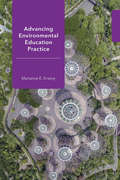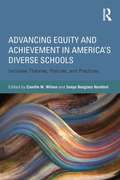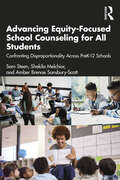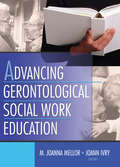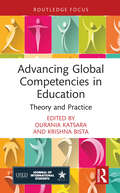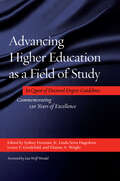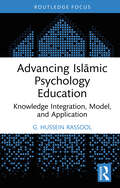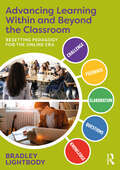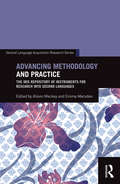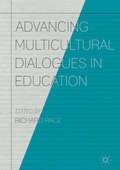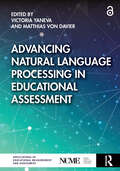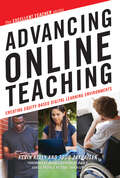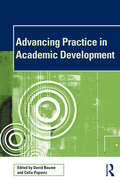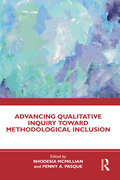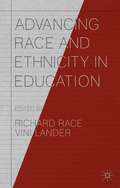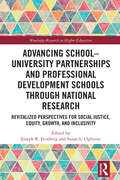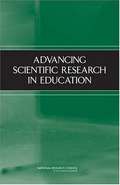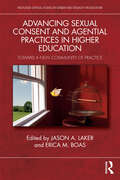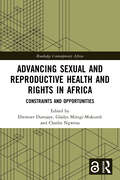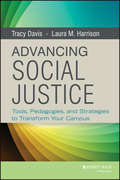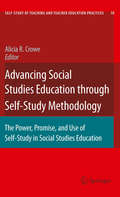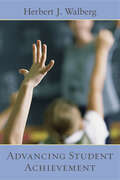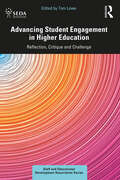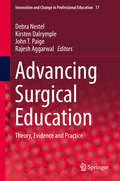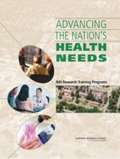- Table View
- List View
Advancing Environmental Education Practice (Cornell Series in Environmental Education)
by Marianne E. KrasnyIn this important intervention, change-agent Marianne E. Krasny challenges the knowledge-attitudes-behavior pathway that underpins much of environmental education practice; i.e., the assumption that environmental knowledge and attitudes lead to environmental behaviors. Krasny shows that certain types of knowledge are more likely than others to influence behaviors, and that generally it is more effective to work with existing attitudes than to try to change them. The chapters expand the purview of potential outcomes of environmental education beyond knowledge and attitudes to include nature connectedness, sense of place, efficacy, identity, norms, social capital, youth assets, and individual wellbeing.Advancing Environmental Education Practice also shows how, by constructing theories of change for their environmental education programs, environmental educators can target specific intermediate outcomes likely to lead to environmental behaviors and collective action, and plan activities to achieve those intermediate outcomes. In some cases, directly engaging program participants in the desired behavior or collective action can lead to changes in efficacy, sense of place, and other intermediate outcomes, which in turn foster future environmental actions. Finally, Advancing Environmental Education Practice shares twenty-four surveys that assess changes in environmental behaviors and intermediate outcomes, and provides guidelines for qualitative evaluations.Thanks to generous funding from the Cornell Department of Natural Resources, the ebook editions of this book are available as Open Access volumes from Cornell Open (cornellopen.org) and other Open Access repositories.
Advancing Equity and Achievement in America's Diverse Schools: Inclusive Theories, Policies, and Practices
by Sonya Douglass Horsford Camille M. WilsonAdvancing Equity and Achievement in America’s Diverse Schools illustrates how educators, students, families and community partners can work in strategic ways to build on social, cultural, and ethnic diversity to advance educational equity and achievement. By drawing on the latest data on demographic change, constructions of culture and cultural difference, and the politics of school reform in urban, rural, and suburban school communities, this volume looks toward solutions and strategies for meaningful educational improvement. Contributors consider both the diversity of youth and families served in public schools, and the culture of U.S. schooling, highlighting the influence of policy and reform agendas; students’ identities and agency; experiences and approaches of diverse educators; and the workings of effective school partnerships. Chapters also focus on those often overlooked in educational scholarship such as Native Americans, students experiencing poverty and/or homelessness, Muslim students, students with special needs, and students and educators who are lesbian, gay, bisexual, transgender, intersex, or queer. In all, this edited collection stresses the need for high quality education that is inclusive, culturally responsive and unifying so all students can experience academic success. This book is a meaningful resource for educators, policymakers, and community-based leaders interested in doing such transformative work.
Advancing Equity-Focused School Counseling for All Students: Confronting Disproportionality Across PreK-12 Schools
by Sam Steen Shekila Melchior Amber Brenae Sansbury-ScottUsing author narratives, this book brings attention to racial disparities that currently exist in schools within the historical context of pivotal legal cases in America while emphasizing the importance of assessing and supporting students through a culturally appropriate lens that recognizes student strengths. The authors provide current and historical frameworks through which school counselors can develop a more socially just and liberation-orientated school counseling program. These frameworks center and unveil the ways in which social rank, segregation, and racism influence development, particularly for Black and Brown children. The book underscores the value of community partnerships and the role of strategic partnerships to support a college culture, particularly for student populations with historically limited access to higher education. Readers will also learn about misconceptions of racially and ethnically minoritized children and the related impacts on misdiagnosis and overrepresentation in special education. School counselors looking to ensure equity and social justice within their classrooms, analyze their own privilege, and support students of all backgrounds will find this timely text indispensable in creating a program that fosters understanding and growth.
Advancing Gerontological Social Work Education
by Joanna Mellor Joann Ivrys your gerontological social work program as comprehensive-and as well attended-as it could be? Advancing Gerontological Social Work Education will help you develop courses that effectively prepare social work students and practitioners to work with the ever-increasing older population. It clearly presents the rationale for geriatric/gerontological preparation and defines the current status of geriatric/gerontological education. With fascinating case studies, detailed curricula, and a review of the skills and knowledge competencies necessary for effective geriatric social work practice, this book also describes a variety of courses and teaching programs in detail-noting the problems that other educators have encountered and offering practical suggestions to help in replicating the programs in other institutions. This book is especially useful because it not only examines the issues surrounding-and need for-increased gerontological education for social workers, but because it follows this with specific, concrete descriptions of educational approaches and curricula. It provides you with both the framework and the specifics to develop your own gerontological social work education program at the graduate or undergraduate level. Helpful charts and tables make the information easy to access and understand. Advancing Gerontological Social Work Education is divided into three sections, each of which will increase your knowledge and understanding of this vital area of social work education. The first section examines: the historical development of gerontological social work education the CSWE/SAGE-SW Competencies Project the importance of interdisciplinary teamwork-and the educational basis for interdisciplinary team training, highlighting organizational context, team structure, team process, and team outcomes ways to increase students' interest in this vital area of social work In the second section of this well-referenced book, you will examine school-based initiatives, focusing on: the development and implementation of the John A. Hartford Foundation Geriatric Social Work Initiative the recruitment of students into geriatric social work-with an examination of a fellowship program the relationship between the aging population of the United States and the growing demand for geriatric social workers-and how that need can be met through graduate-level social work training developing a field training rotation model a doctoral fellowship program and its dissertation support, mentorship, and leadership development The third section of Advancing Gerontological Social Work Education features: an empirical study exploring the potential for a limited curriculum module to enhance MSW and BSW students' gerontological practice-related knowledge, attitudes, and interest an overview of the history and rationale of service learning in elder care a description of the varied service learning in elder care programs an experiential exercise that was used successfully to assist graduate students in integrating and applying their knowledge about geriatric assessment the results of interviews with MSW students about the appropriateness of their preparation for medical social work with an aged population-conducted at the beginning, midpoint, and end of their field placements a report on incorporating intergenerational service learning into an undergraduate introductory gerontology course the use of the "family study," which exposes teams of students for 20 weeks to a family that includes an older adult
Advancing Global Competencies in Education: Theory and Practice (Routledge Studies in Global Student Mobility)
by Krishna Bista Ourania KatsaraAdvancing Global Competencies in Education offers an in-depth and insightful exploration into the evolving field of international education and intercultural communication. This comprehensive volume brings together innovative practices, case studies, and diverse perspectives from prominent scholars and practitioners across the globe, making it an essential resource for the contemporary educational landscape. With a strong emphasis on diversity, inclusion, and the enhancement of intercultural competence, this collection offers both theoretical insights and practical strategies. It serves as a vital resource for educators, policymakers, and practitioners dedicated to promoting intercultural understanding and collaboration within educational settings.
Advancing Higher Education as a Field of Study: In Quest of Doctoral Degree Guidelines - Commemorating 120 Years of Excellence
by Linda Serra Hagedorn Lester F. Goodchild Sydney Freeman Dianne A. WrightWinner of the 2015 Auburn Authors AwardsWhere is higher education as a field of study going in this century? How will higher education program leaders design and sustain their degree programs’ vitality in the face of perennial challenges from inside and outside the academy? While in 1979 the Council for the Advancement of Standards in Higher Education (CAS) defined standards for student affairs master’s level preparation, and while 2010 saw the adoption of guidelines for higher education administration and leadership preparation programs at the master’s degree level, there still are, however, no guidelines that address higher education leadership doctoral programs, despite increasing demands for assessment and evaluation. This book suggests that higher education administration doctoral degree guidelines are a critical next step in advancing their program quality and continuity. It offers a review of the field’s history, the condition of its higher education programs, developments from the student affairs specialization and its guidelines, and a multi-chapter dialogue on the benefits or disadvantages of having guidelines. At a time of urgency to prepare the next generation of higher education faculty and leaders, this book sets out the parameters for the debate about what the guidelines should cover to ensure the appropriate and effective preparation of students. It also offers a useful framework for enriching the knowledge of deans, chairs, program coordinators and faculty who are engaged in program design, assessment, and revision. It will also be of interest to policymakers, the personnel of accrediting agencies, and not least graduate students within higher education preparation programs. All the contributors to this volume have the exemplary expertise, leadership experience, and a close association with higher education guidelines and standards, and have extensively contributed to the literature on higher education.
Advancing Islāmic Psychology Education: Knowledge Integration, Model, and Application (Islamic Psychology and Psychotherapy)
by G. Hussein RassoolThis book provides academic and clinical institutions for developing their educational programmes in psychology, psychotherapy, and counselling from an Islāmic paradigm. Examining the educational approach in the decolonisation of psychology curricula, the book proposes a vertically and horizontally integrated, embedded curriculum model. This model meets the changing needs of practitioners, incorporating indigenous cultural aspects and emerging technologies to reflect new and creative ways of thinking about delivering education in the post Covid-19 era. The chapters also demonstrate how curriculum development, based on the principles of Islamic education, helps institutions to establish purpose, define activities, and guide decision making in educational development. A series of steps for implementing this need-driven educational programme has been suggested. This practical, concise, and evidenced-based text will be a key resource for educators and trainers. It will help them understand how to re-design or suggest changes to curriculum structure, shape, and content in Islāmic psychology, psychotherapy, and counselling for undergraduate, postgraduate and continuing professional development levels of education.
Advancing Learning Within and Beyond the Classroom: Resetting Pedagogy for the Online Era
by Bradley LightbodyThis insightful book sets out five core elements of good practice that will lead to great teaching and learning both within and beyond the classroom. It looks in detail at the learning process and how teachers can support this through a rich mix of teacher-led direct instruction and collaborative and online learning, both flipped and blended. Covering five major themes to reset our pedagogy, Advancing Learning Within and Beyond the Classroom presents the key evidence about ‘what works’ alongside practical activities to adopt or adapt to enhance your own practice. The chapters cover: the application of precise curricular knowledge the presentation of key questions to guide, check and deepen learning elaboration to build deep understanding personalised feedback to accelerate progress the introduction of regular challenges to drive high learning outcomes and relevant commercial and world-class standards Including a comprehensive overview of evidence-based practice and a wealth of practical strategies to drive engagement and productive learning, this is essential reading for all teachers working in secondary schools or further education.
Advancing Methodology and Practice: The IRIS Repository of Instruments for Research into Second Languages (Second Language Acquisition Research Series)
by Alison Mackey Emma MarsdenInstruments for Research into Second Languages is an accessible introduction to understanding and evaluating existing and emerging methodologies in L2 research. The book provides an introduction to the data collection materials available in the IRIS database. IRIS is an open access, searchable repository of instruments used to elicit data for research into second and foreign language learning and teaching. The book is aimed at graduate students, researchers and educators in the fields of Applied Linguistics and Second Language Acquisition. Featuring contributions from top scholars in the field, this dynamic volume includes empirical research carried out using innovative instruments held in IRIS, offering insights into their basic mechanics, how and why they are used, as well as the challenges they can present. The chapters describe the kinds of data (evidence about knowledge, processing, interaction, learning, and motivation) that result from these methods, and they discuss conditions that lead to reliable and valid data collection and analysis. This unique collection provides researchers, professionals, and students with up-to-date responses to practical and theoretical questions about how second language learning and teaching can be investigated using the IRIS database of instruments. IRIS was funded by the Economic and Social Research Council and is a long term British Academy Research Project.
Advancing Multicultural Dialogues in Education
by Richard RaceThis edited collection advances the call for continued multicultural dialogues within education. Dialogue and education are the two most essential tools that can help tackle some of the biggest problems we are facing across the globe, including fanaticism, chauvinistic nationalism, religious fundamentalism and racism. The contributors to this book explore the necessity of sustained dialogue within the wider social and political sciences alongside in national and international politics, where more multicultural voices need to be heard in order to make progress. The book builds on existing evidence and literature to advocate in favour of this movement, and highlights how important and significant multiculturalism and multicultural education remains. It will be essential reading for students and academics working in the fields of education and sociology, particularly those with an interest in social justice and multiculturalism.
Advancing Natural Language Processing in Educational Assessment
by Matthias Von Davier Victoria YanevaAdvancing Natural Language Processing in Educational Assessment examines the use of natural language technology in educational testing, measurement, and assessment. Recent developments in natural language processing (NLP) have enabled large-scale educational applications, though scholars and professionals may lack a shared understanding of the strengths and limitations of NLP in assessment as well as the challenges that testing organizations face in implementation. This first-of-its-kind book provides evidence-based practices for the use of NLP-based approaches to automated text and speech scoring, language proficiency assessment, technology-assisted item generation, gamification, learner feedback, and beyond. Spanning historical context, validity and fairness issues, emerging technologies, and implications for feedback and personalization, these chapters represent the most robust treatment yet about NLP for education measurement researchers, psychometricians, testing professionals, and policymakers.
Advancing Online Teaching: Creating Equity-Based Digital Learning Environments
by Kevin Kelly Todd D. ZakrajsekThe goal of teaching online is fundamentally the same as teaching face-to-face: facilitating the learning of all students to the greatest extent possible. This book differs from other books on online teaching in that, in the process of offering guidance on course design and planning, developing outcomes and appropriate engaging activities, managing the workload and assessment, the authors pay explicit attention throughout to the distinct and diverse needs of students and offer effective strategies to accommodate them in a comprehensive and inclusive way by using the principles of Universal Design for Learning. By following those principles from the outset when planning a course, all students will benefit, and most particularly those whom the research shows have the greatest achievement gaps when taking online courses -- males, first generation and low income students, those from underrepresented minority groups, the academically underprepared, students with disabilities, and those with limited online access or lacking readiness for online learning. Beyond good planning and design, Kelly and Zakrajsek offer ideas for creating inclusive course environments and activities, such as using culturally appropriate content and making it accessible in multiple formats. They also share methods to foster faculty-learner interaction and increase personal connections with students, and among students, through group activities or learning communities, which are so critical to motivation and success. Faculty new to online teaching as well as more experienced readers will find a wealth of practical guidance on developing and honing both fully online and blended courses and, as importantly, a wealth of proven ideas to help the new generation of students with diverse needs to succeed.
Advancing Practice in Academic Development (SEDA Series)
by David Baume Celia PopovicWithin the field of academic development, the last twenty years have seen a great expansion of published research into practice and the further development of theoretical approaches. This growth in the scholarship of academic development matches a growth in the scholarship of teaching and learning. Advancing Practice in Academic Development draws on these evolving scholarships to advance professional practice in academic development, addressing questions such as: . How have global academic developers and their units developed and changed over recent decades? How has the context in which academic development work is done altered? What have academic developers and their professional associations learnt? Case studies and examples are used throughout the text to illustrate development scenarios and methods. Academic development is considered as, among others, a critical, a scholarly, a principled, a pragmatic, a supporting and a leadership role. This book is ideal for use on academic development courses run by SEDA and other international organisations as well as by those who have responsibility for leading the improvement of educational practice. Written in a scholarly, accessible, stimulating and practical style, this book acknowledges difficulties and offers ways forward. As well as analysing problems, it offers solutions. Links to web sources referenced in this book can be found at www.seda.ac.uk/apad
Advancing Qualitative Inquiry Toward Methodological Inclusion
by Rhodesia McMillianThis fascinating book provides a groundbreaking resource for innovative approaches to qualitative inquiry that address equity and justice and equip readers with tools to enact these approaches in their own work.Comprising contributions from award-winning qualitative scholars, chapters show how methodologies can be employed to address social issues and problems from the social-political milieu including education, COVID-19, racial inequalities, health inequalities, climate change, and debates around gender diversity amongst others. This book offers the new and innovative paradigms, methodologies, and methods a cutting-edge group of scholars has crafted as well as the ‘how to’ so readers may employ these approaches in dissertations, grants, and various research team scholarship. Contributors reimagine the next generation of “rigorous” qualitative methodologies by pushing on the boundaries of existing methodological approaches as well as presenting new ways of engaging in research that prioritise innovation, equity and justice.This unique edited volume is aimed at students and researchers studying or using qualitative methodologies and inquiry who wish to be exposed to emergent conceptualizations and innovations regarding qualitative research methodology and its congruent methods.
Advancing Race and Ethnicity in Education
by Vini Lander Richard RaceThis timely collection focuses on domestic and international education research on race and ethnicity. As co-conveners of the British Education Research Associations (BERA) Special Education Group on Race and Ethnicity (2010-2013), Race and Lander are advocates for the promotion of race and ethnicity within education. With its unique structure and organisation of empirical material, this volume collates contributions from global specialists and fresh new voices to bring cutting-edge research and findings to a multi-disciplinary marker which includes education, sociology and political studies. The aim of this book is to promote and advocate a range of contemporary issues related to race, ethnicity and inclusion in relation to pedagogy, teaching and learning.
Advancing School-University Partnerships and Professional Development Schools through National Research: Revitalized Perspectives for Social Justice, Equity, Growth and Inclusivity (Routledge Research in Higher Education)
by Joseph R. Feinberg Susan L. OgletreeThis book offers a comprehensive guide to the impact of professional development schools and school–university partnerships (PDSs-SUPs), articulating both the major issues that confront PDSs-SUPs and the various research methods shaping the field.Stemming from a national PDS research conference and project funded by the American Educational Research Association, this collaborative effort presents a vision aimed at promoting inclusive, equity-focused research within PDSs-SUPs and delves into the insights of researchers as they examine revitalized perspectives, persistent challenges, and emerging areas of study.This volume will appeal to scholars, teachers, teacher educators, university students, and education policymakers with interest in social justice in research, teacher education, and P-12 partnerships.
Advancing Scientific Research In Education
by National Research Council of the National AcademiesTransforming education into an evidence-based field depends in no small part on a strong base of scientific knowledge to inform educational policy and practice. Advancing Scientific Research in Education makes select recommendations for strengthening scientific education research and targets federal agencies, professional associations, and universities—particularly schools of education—to take the lead in advancing the field.
Advancing Sexual Consent and Agential Practices in Higher Education: Toward a New Community of Practice (ISSN)
by Jason A. Laker Erica M. BoasThis book provides an in-depth exploration of sexual consent communication and negotiation practices among students and efforts to prevent and respond to sexual coercion and violence within the context of North American higher education institutions.Delving into the complexities of communication around sexual consent, it examines how factors such as identity, early learning experiences, societal norms, and coercive elements influence interactions among young adult postsecondary students. It emphasizes the importance of agency in intimate settings and how this is shaped by these factors. The methodology employed in this decade-long research is innovative and interview-based, providing a rich narrative from student perspectives. These narratives serve to highlight the intricate interplay between individual agency and societal expectations in intimate situations. The book also incorporates valuable insights from other experts in the field. These contributions serve to contextualize the study’s findings within the broader theoretical framework and research on the subject. This approach not only enriches the descriptions of the study but also provides a more holistic understanding of the topic. As such, the book ultimately helps to inform educational policies and professional practices to promote sexual agency and address pressing issues such as sexual coercion, violence, and assault on campus.This volume will appeal to researchers and stakeholders in higher education, including educators, upper-level students, professional practitioners, and parents. In doing so, it contributes to the conversation around creating a safer and more respectful environment in higher education institutions.
Advancing Sexual and Reproductive Health and Rights in Africa: Constraints and Opportunities (ISSN)
by Ebenezer Durojaye Gladys Mirugi-Mukundi Charles NgwenaThis book explores recent developments, constraints and opportunities relating to the advancement of sexual and reproductive health and rights in Africa.Despite many positive developments in relation to sexual and reproductive health in recent years, many Africans still encounter challenges, for instance in poor maternity services, living with HIV, and discrimination on the basis of age, gender, sexual orientation or identity. Covering topics such as abortion, gender identity, adolescent sexuality and homosexuality, the chapters in this book discuss the impact of culture, morality and social beliefs on the enjoyment of sexual and reproductive health and rights across the continent, particularly in relation to vulnerable and marginalized groups. The book also explores the role of litigation, national human rights institutions and regional human rights bodies in advancing the realization of sexual and reproductive health and rights in the region. Throughout, the contributions highlight the relevance of a rights-based framework in addressing topical and contentious issues on sexual and reproductive health and rights within Sub-Saharan Africa.This book will be of interest to researchers of sexuality, civil rights and health in Africa.The Open Access version of this book, available at http://www.taylorfrancis.com/books/e/9781003175049, has been made available under a Creative Commons Attribution-Non Commercial-No Derivatives 4.0 license.
Advancing Social Justice
by Laura M. Harrison Tracy DavisThis groundbreaking book offers educators a clear understanding of the concept of social justice and includes effective practices to help them promote social justice and address identity development on their campuses. In the first half of the book, the authors clarify the definition of social justice as an approach that examines and acknowledges the institutional and historical systems of power and privilege on individual identity and relationships. They provide important frameworks and foundational aspects of understanding social justice, and several chapters explore identity development using the critical lenses of history and context, concentrating on ways that oppression and privilege are manifest in the lived experiences of students. In the second half of the book, the authors supply educators with the conceptual tools and strategies needed to infuse a social justice approach into their work with students and within their institutions. They highlight important concepts to consider in designing and implementing effective social justice interventions and provide examples of effective social justice programs.
Advancing Social Studies Education through Self-Study Methodology: The Power, Promise, and Use of Self-Study in Social Studies Education (Self-Study of Teaching and Teacher Education Practices #10)
by Alicia R. CroweAdvancing Social Studies Education through Self-Study Methodology provides a collection of works that highlights ways in which self-study of teaching and teacher education practices can advance conversations and knowledge in social studies education. Some of the pieces chosen for this book will provide theoretical connections between the two fields (e.g. how values and principles important to both fields work together, are similar, and can help each field expand). Others will provide specific examples of self-studies that focus on social studies specific concepts. The book provides a strong and clear introduction of self-study to the field of social studies education as well as an argument for its use to further understand social studies teaching and teacher education. It also provides the self-study community with an example of how self-study can be used to look at content specific aspects of teaching and teacher education.
Advancing Student Achievement
by Herbert J. WalbergA renowned educator-psychologist explains how children learn and how family, classroom, and school practices can help them learn more effectively. In addition to drawing on studies of learning outcomes, the author reveals economic research on teacher education and school choice that challenges many popular assumptions.
Advancing Student Engagement in Higher Education: Reflection, Critique and Challenge (SEDA Series)
by Tom LoweProviding a selection of critical pieces on the key challenges and debates in student engagement in higher education, this edited collection of sector-leading, scholarly-informed critical reflections is designed to consider and build upon what can be done to advance student engagement. By problematising student engagement practice, this book explores how to strengthen policies, recognise the issues and create solutions to overcome barriers and tensions. It considers topics such as diversity, accessibility, representativeness, evidencing impact, data analytics, the campus estate and the impact of COVID-19. The contributors provide lessons learned and knowledge from the field to make practice with students more considered and robust for the challenges ahead in the post-pandemic university. Moving beyond endorsing student engagement and offering best practice to critically reflect on and challenge our engagements with students in contemporary higher education, this book is ideal reading for all those developing education, course leaders and heads of academic departments, as well as anyone interested in advancing student engagement in their higher education setting.
Advancing Surgical Education: Theory, Evidence and Practice (Innovation and Change in Professional Education #17)
by Debra Nestel Kirsten Dalrymple John T. Paige Rajesh AggarwalThis book is designed for anyone involved in surgical education. While it is intended as a core reference for surgeons who want to develop their surgical education knowledge and practice, it also a valuable resource for anyone undertaking a higher degree in health professions education. Divided into five parts, it starts with chapters on foundational knowledge, exploring the past before documenting the current state of surgical education and highlighting various educational leadership and governance topics. The second part examines a range of theories that inform surgical education – cognitive, behavioural and social, while the third part offers practical guidance on elements of surgical education – curriculum design, selection, feedback, assessment, evaluation, simulation and managing trainee underperformance. It also includes chapters on supporting the development of psychomotor skills, operative skills in theatre, professionalism, teamwork and patient safety. The next part shifts the focus to research in surgical education, introducing readers to all phases of conducting education research based on qualitative, quantitative and mixed methods paradigms. The final part looks to the future of surgical education and of surgical educators. Assembling these topics in one volume makes this book invaluable to anyone involved in surgical education.
Advancing The Nation's Health Needs
by Committee for Monitoring the Nation's Changing Needs for Biomedical Behavioral Clinical PersonnelThe National Institutes of Health’s role in supporting research has long been recognized as a major factor in advancing the health needs in the nation and the world. The National Research Council was charged with the responsibility of periodically assessing the National Institutes of Health’s National Research Service Awards program, thus this book is the twelfth edition in the series. While the National Research Service Awards program now supports only a fraction of the training in the biomedical, clinical, behavioral, and social sciences, it sets a high standard for the training in all doctoral programs in these fields. Also included are the training needs of oral health, nursing, and health services research. This book has been broadly constructed to take into account the rapidly evolving national and international health care needs. The past and present are analyzed and predictions with regard to future needs are presented.
